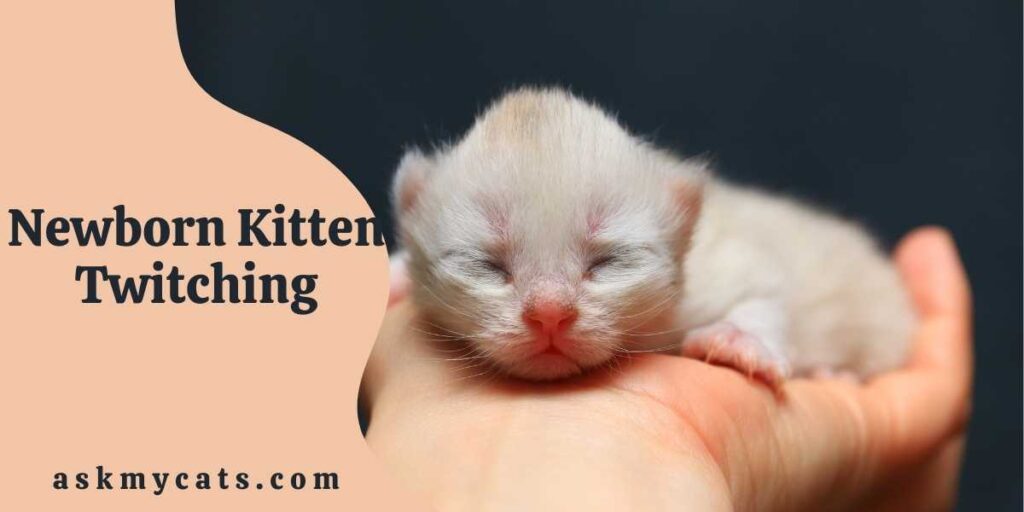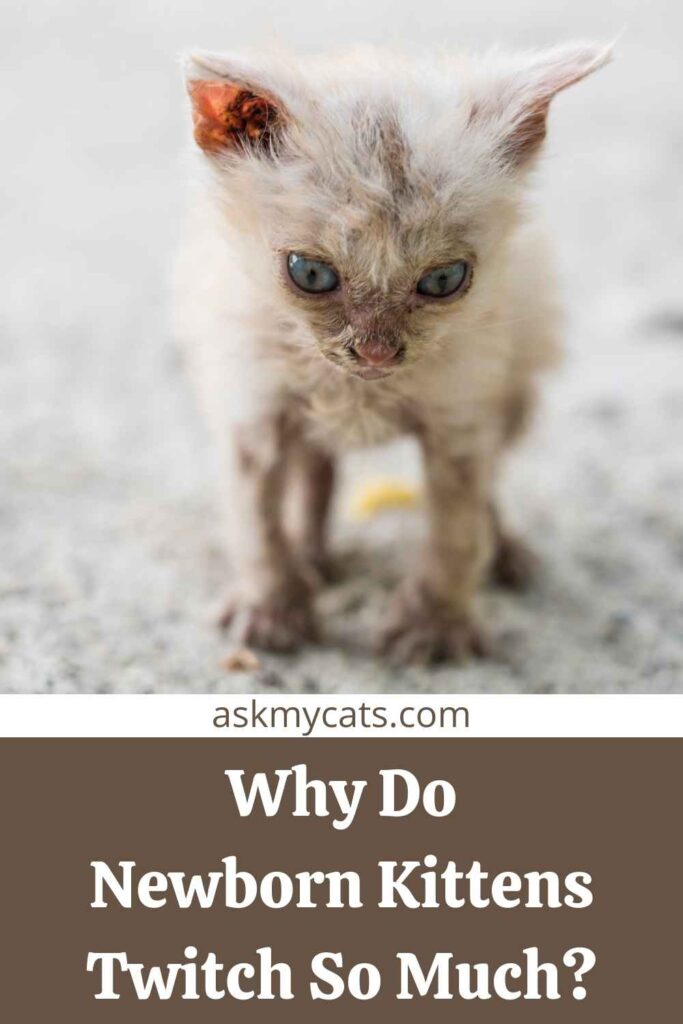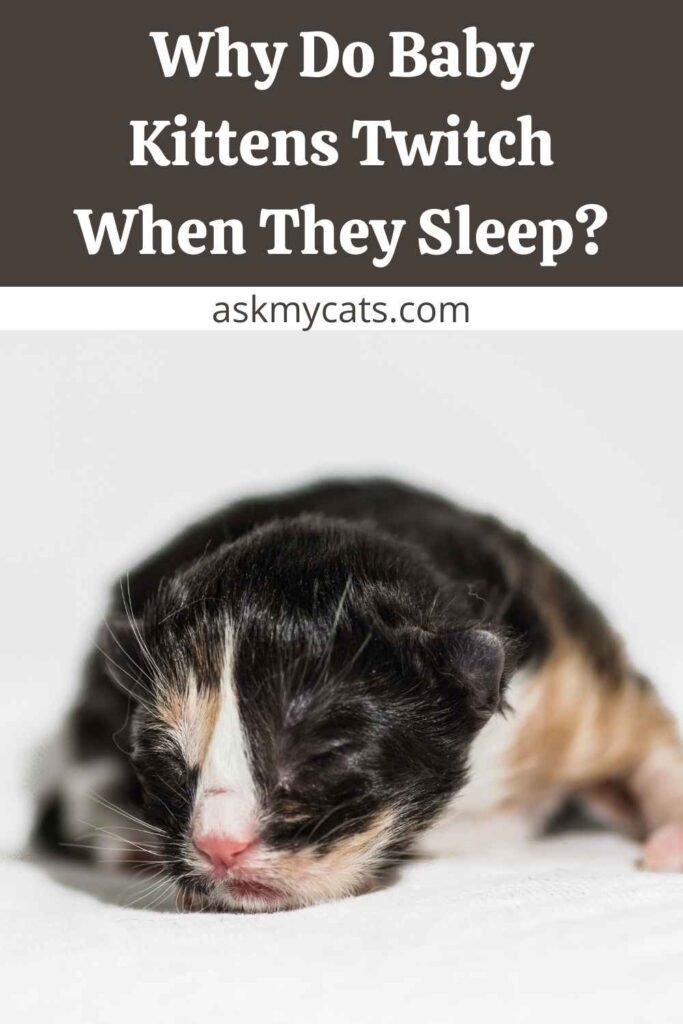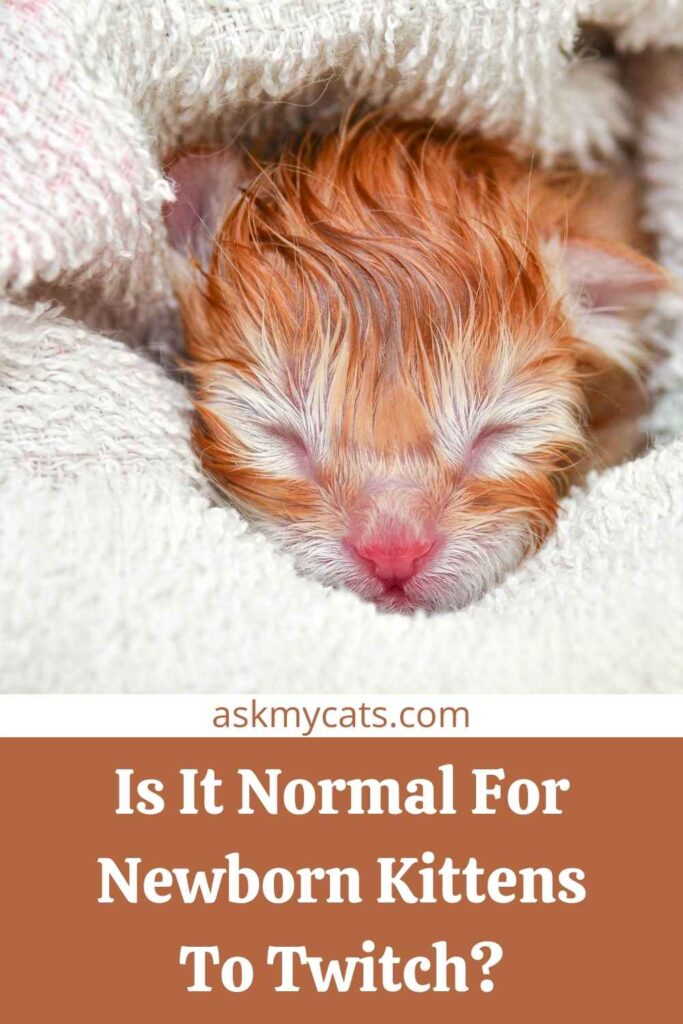You may have observed some twitching while admiring your kitten’s varied resting postures. Have you ever been perplexed as to why this occurs? What’s going on inside their heads? Are they hallucinating?
It’s usual for newborn kittens to have little twitching motions when sleeping. Don’t be alarmed if you notice your kitten jerking while sleeping.
Continue reading to learn more about the science behind why kittens twitch when sleeping.


Give Your Cat the Perfect Day
Get the Free Ebook!
Why Do Newborn Kittens Twitch So Much?
Some experts think newborn kittens are twitching due to uncontrollable muscular spasms. However, most experts believe that kittens twitch during sleeping in the rapid eye movement (REM) stage.

If your cute little kitten twitches frequently while sleeping, you may be afraid that the problem is severe.
Many kittens, on the other hand, twitch while sleeping. They may produce vocal or sucking noises, wiggle their ears, or knead the air. There are several hypotheses as to why this is.
The REM stage is when we recall our dreams in humans. When compared to the human sleep pattern, kittens sleep up to 16 hours each day, with REM sleep accounting for a higher amount of their sleep.
Younger kittens twitch more than older kittens, as you may have seen. Beyond the fact that they both fall into REM sleep, humans and kittens share the fact that their young have undeveloped nerve systems. Kittens’ twitching during sleep aids in the proper development of their nervous system.
Twitching when sleeping is a natural and frequent characteristic in most kittens. If your kitten is also sluggish, has a decreased appetite, vomits, their body stiffens, or has jerky motions when they twitch, or they are difficult to wake up, you should consult a veterinarian.
These signs and symptoms might be signs of a more serious condition. Your kitten’s whole-body stiffness and jerky movements might indicate that he’s experiencing a seizure rather than merely twitching.
Seizures don’t just happen when you’re sleeping, so you’ll probably notice them while your kitten is up as well. If your kitten has seizures, you’ll notice that they act strangely even while they’re awake; they may have shaky feet or look disoriented.
You would also like to check about Cat Shaking After Giving Birth: Possible Reasons
Why Do Baby Kittens Twitch When They Sleep?
The neurological systems of kittens are continually activating and forming neuron connections, which is why newborns move their limbs so much and kittens twitch when they sleep.

Kittens’ twitching during sleep aids in the healthy development of their nervous system. Twitching when sleeping is a very common incident in most kittens.
Kittens go through three different stages of sleep. They take brief “catnaps,” which are the lightest kind of sleep. Kittens are very aware of their environment when sleeping.
While having a catnap, you may observe that your kitten’s ears continue to turn in reaction to sounds. Catnaps began as a natural protection strategy in wild kittens, and the trait has since been handed down to domestic kittens.
The REM period of sleep is also known as deep sleep. This stage lasts only five to ten minutes at a time, and it is at this period that kittens twitch and most likely dream.
Kittens go through two stages of sleep when they are genuinely sleeping: deep sleep and light sleep. In terms of time and level of consciousness, light sleep falls in between catnap and profound sleep.
Activated sleep is a fourth sleep stage for kittens. A kitten’s nervous system is active during activated sleep (rather than being at rest throughout sleep), and they may scream, wriggle, or have more severe twitches than the normal kitten twitch.
This, like other nerve firings in young animals, is necessary for nervous system maturation. A sleeping kitten should never be roused. They require a lot of sleep to compensate for the amount of energy they expend while awake!
Kittens may not fall into deep slumber if they are uncomfortable or feel dangerous. Provide your kitten with a bed or other cushioned, elevated sleeping space to create a welcome sleeping environment for them.
Kittens may escape various stimuli on the ground, such as youngsters or other animals, by sleeping on an elevated platform. This should be done in a somewhat cool room.
Your kitten may curl up into a ball to sleep if the temperature is chilly enough. Warmer temperatures cause kittens to sleep in a more relaxed position.
Remember that a kitten’s twitches are typically harmless. Even watching a kitten twitch may be amusing! So sit back, relax, and take in the free entertainment.
Also read out about Why Is My Cat Vibrating? Is Cat Trembling Normal?
Is It Normal For Newborn Kittens To Twitch?
It is completely normal for newborn kittens to twitch.

When kittens are sleeping, they twitch, which is a natural ‘dreaming’ behavior. Please ensure that your kitten does not sleep on a cold surface or in a chilly environment, as tremors might indicate a drop in body temperature.
Kittens, like people, dream while they sleep. Our dreams are shaped by our experiences and imagination, and kittens’ dreams are no different. They may be able to recall prior experiences and instincts while sleeping.
Emotional or irritated kittens seem to concentrate all of their energy onto the top 2 inches of their tails, which twitch rapidly back and forth. When you pet a kitten, it’s common for their tails to twitch.
Small twitches in sleep might be your kitten fantasizing about pursuing a mouse or perhaps playing with her feline buddies.
You may observe your kitten twitching, stretching, snoring, or even making weird squeaking noises when they are sleeping. It’s typically nothing to worry about because they’re all symptoms of REM sleep.
When your kitten twitches when sleeping, it’s usually due to impulses delivered to their brain while they’re ‘dreaming.’
Some individuals fear that the twitching is a seizure, although seizures seldom happen while sleeping, and they usually come with other symptoms like the rigidity of the entire body, tiredness, loss of appetite, or vomiting.
If your kitten is exhibiting these symptoms, you should take them to your veterinarian as soon as possible.
What Should I Do If My Newborn Kitten Is Twitching?
You should not worry if your newborn kitten is twitching as it is normal behavior during sleep. However, if you notice any unusual tremors in your kitten while sleeping, then you have to visit a vet.
Because twitching is a collection of symptoms rather than an illness, it cannot be completely ignored. Treating particular indications and hoping for the best is the best line of action.
If you see any strange signals in a newborn kitten, notably lethargy, excessive tremors, shaking unevenly, and/or difficulty breathing, contact a veterinarian straight away. The kitten will be inspected and parasites and diseases will be tested.
The veterinarian will recommend a treatment plan to address any infection, as well as to avoid hypothermia, starvation, and dehydration.
Frequently Asked Questions
Why do kittens tremble while sleeping?
When your kitten shivers before going to sleep or during sleeping, it’s generally because messages are delivered to the kitten’s brain during the dreaming period. Kittens, like humans, go through the REM sleep phase as they are ready to fall asleep. During this time, kittens are more inclined to dream.
Why is my cat’s body twitching?
Muscle twitching on your cat’s back might be caused by painful back, tail, or anal glands. Muscle twitching can be caused by irritating skin problems such as allergies or parasite infestations. An illness is known as “Feline hyperaesthesia” causes muscle twitching as a result of overly sensitive skin.
Is my cat twitching or having a seizure?
When a cat has a seizure, there are a variety of symptoms to look for. Collapsing, frothing at the mouth, limb jerking, severe muscular spasms throughout the body, loss of consciousness, and uncontrollable peeing or defecating are some of the symptoms.
Final Words
Nine times out of ten, your kitten is twitching for healthy and natural causes. Kittens of all ages twitch as a result of muscular spasms, a growing neurological system, and frequent dreaming.
Twitches, on the other hand, can be an indication of a seizure if they are accompanied by some specific symptoms. If you think your kitten’s twitching is caused by disease, take him to the vet.
Ask your questions in the comments section below.
